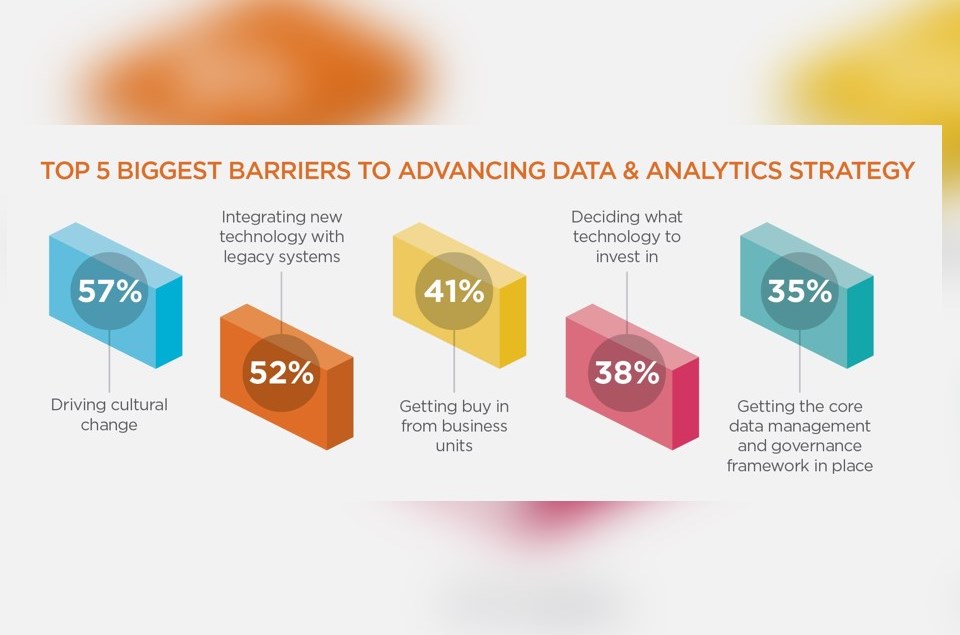Welcome to the new year, filled with new opportunities, predictions and repetition. With the momentum from 2017, we can expect digital strategy to become the core of several businesses in South Africa and across the continent. The time for deliberating is over, now is the time for action.
Organisations will be forced to transform or will lose out on market share, lose intellectual capital and eventually fade away into the ether. A new breed of digital-savvy leadership will emerge and incorporate only the (right) products and services they need to enhance their business operating procedures and systems. Gone are the days of chucking it against a wall and hoping it sticks!
In the run-up to the Chief Digital Officer Africa conference taking place in Johannesburg from 5-7 March, I have put together a list of top 10 predictions and trends for Africa in 2018.
1) Digital transformation, the killer buzzword moving from theory to reality
Digital transformation (DX) may once have been a clever bit of market-speak, but has evolved into an imperative in todays business market. Although disruption will still be present in several industries, those companies who fail to adapt, and adapt quickly, will soon fall by the wayside.
According to the IDC 2018 DX Predictions report, DX spending will reach $1.7 trillion globally by 2019, that’s a massive 42% increase on 2017 spend. Albeit most of this is going on infrastructure and software, the impact of DX is company wide, steeped in cultural change and process evolution. A further prediction is that 60% of global businesses will have embarked on a digital transformation process by 2020.
Moving past the (often confusing) ubiquity of DX, organisations are starting to evolve beyond the customer-facing app/web driven UX stuff and will be focusing more on integrating back-end operations. Systems and infrastructure is in place (or planned), but now it is the task of breaking down internal silos. Some organisations have the technology, tools, people and thinking in place to bring the customer experience in line with business models and operational processes.
Those who haven’t got their house in order, will have to catch up, and do so quickly. The adage that South Africa tends to lag behind global trends by 18-24 months, is increasingly becoming a misnomer. South Africa (and the continent as a whole) is catching up, but in its own, often creative, way. Expect more social commerce, digital growth in the informal sector, and an increase in mobile transactions.
2) The rise of the Chief Digital Officer… for now.
Accepting the task of “digitising” the organisation has often fallen to the CIO or the CMO (especially in the US). What we are finding locally is an increase in Chief Digital Officer titles, often a reformed business-focused IT professional brought in to bridge the gap between IT, marketing and operations.
Chief Digital Officers are brought in as a stop-gap, a transitory role that may well see them become redundant within 18-24 months; ironically, if they do their job well enough, their tenure may be even shorter!
“Digital” should not be the mandate of a single individual or office, but needs be incorporated and integrated company wide. But, there is a need for a Chief Digital Officer to kick things off and to develop, implement and drive a digital strategy.
In addition to the Chief Digital Officer role emerging, 2018 will also see a change, or a reduction, in the role of the technical CIO. The “new” CIO will require a strong business acumen and be a digital executive who looks at customer, operations and engagement. Data and analytics should find a permanent home in a dedicated data office, preferably under a Chief Data Officer. The role of infrastructure custodian could likely fall to integrated departments.
3) Inevitable organisational change
More and more is spent on infrastructure, systems and software, transformation isn’t a one-size-fits-all nor is it linear. The combination of technology, business processes, people and culture are the pillars that hold up business success. If you don’t engage and develop your employees whilst investing in millions on kit, you’re just not going to make any significant change. Corporate culture is evolving to a sense of shared ownership and accountability, a culture of independence and empowerment, but with collaboration and trust. As the end-customer falls strongly into focus, the internal engagement needs to correspond. One simply cannot exist without the other.
4) Artificial Intelligence goes mainstream
Artificial Intelligence, is often misquoted, misunderstood and often used to bulk up marketing waffle. If it’s not threatening to take our jobs, it’s the fear of intelligent machines enslaving the human race, to loss of justifiable income for c-suite executives.
But, in 2018 Artificial Intelligence technology (or at least the phrasing thereof) will firmly be in the spotlight. Thanks to big data, Artificial Intelligence processes and deep-learning algorithms, advances are being made from personalising customer experiences to powering electric vehicles and integrating smart homes. In 2017, the IDC predicted the global investment in cognitive and AI systems to eclipse $12 billion; 2018 is set to dwarf that figure.
One can only hope that consumer-facing AI (i.e. Chatbots) will become a little more intelligent. Siri, Alexa and the rest of the home-bot clan are slowly getting there, but aside from weather updates and ordering food (when it works), these devices are still essentially high-end prototypes. Thankfully with improved technology, AI applications will be delivering more in areas of marketing, data aggregation, analytics, customer services and robotics.
In 2018, we will see a greater diversity of companies experimenting with AI to improve efficiency and reduce bottom line expense; AI is ultimately a tool to drive faster, cheaper and smarter automation. South African businesses involved in healthcare, manufacturing, agriculture, mining and other heavy industries will increasingly adopt AI (alongside IoT). AI is out and proud, and no longer the strict domain of financial services and telcos.
5) Unclogging the blockchain
In 2018 we will see a global shift of blockchain programmes from pilot phase to production. Regionally, a close eye will be on Dubai as the city-state prepares to be at the forefront of blockchain transactions for all government transactions, from visas to utility payments.
There will be increased debate between the use of a public blockchain (as used by cryptocurrencies in a deregulated world) and private blockchain which will be permission based and could ultimately be the choice of global corporates. The core benefit of private blockchain is security, it allows rules but can also manage a community; this will become an internal ledger. Commercial transactions will continue on public blockchains and we will likely see an increase in cryptocurrencies as Bitcoin stabilises after its late rally in 2017.
Blockchain will also mature and start playing by the rule of the real regulated world. Clearer sets of rules that can handle disputes or legal ramifications will be implemented. Although the system is intended to be fully liberated, a form of shared democratisation will come into effect to not only protect its users, but allow for dispute reconciliation. This challenge has to be met in 2018 as user numbers soar on various platforms.
The instability of late 2017 might carry over into 2018. Several pundits have equated numerous cryptocurrencies to an elaborate Ponzi scheme that is likely to come crashing down any moment; several “investors” lost heavily in December. But perhaps this is a necessary evil to tap into the true potential of blockchain.
6) 2018 is the year of data privacy with the arrival of GDPR and POPI
Its finally here, the arrival of GDPR and POPI. Two data regulation acts that are going to shake up local and global economies; or so they say. With the abundance of customer data floating in the cloud, data privacy and security is paramount. In 2017 we became aware of several massive data breaches; Equifax, Yahoo, and even Gmail was hacked in some way. Data breaches costs millions, if not billions, of dollars globally every year and a cynic would site carelessness on behalf of the data owners.
The move to complying with GDPR and POPI will experience growing pains. Expect a number of high-profile lawsuits to emerge, and some of them to quietly disappear. It will be interesting to see what form of probationary period will be given to first offenders. If your business is not in line with the new regulations, 2018 could be a bumpy road.
7) Analytics investment will only increase, but what about the data?
Analytics is a multi-billion dollar business with traditional big IT players and literally thousands of SaaS companies selling a variety of products that just about do what you need it to do. The IDC predicts the market to churn $187 billion in revenue by 2019, and investment in South Africa is definitely not slowing down.
Our local market is growing. More customers, more transactions, more mobile phones, more touchpoints, more data… a lot more data. Linked to the use of analytics (and the large investment thereof) is the value and availability of data assets. We already know that data is the cornerstone of any business, but in 2018, it will be taken to a different level.
Access to data is a problem. As a bank, how do you know the purchasing decisions of someone looking to buy a new car – do you know the model, colour, how they are influenced in their buying decision, where they research the vehicle, etc.? If you’re in the fashion business, how can you tell how much time your client spends on social media or when last they purchased tickets to a movie or concert?
As with the point above on data privacy and security, the flipside of the coin is that we will find a greater pooling of data resources between businesses in different sectors. Shared data resources will provide a clearer picture of the client, taking into account assumptions that impact their decision making and behaviour. Through this, we will find greater personalisation of products and services delivering exactly what the customer wants and needs.
8) Foggy IoT?
Fog computing: the extension of cloud computing to any enabled computing device. In the world of connected IoT, every linked device will have the ability to store, process and analyse data. Your smart meter, thermostat or fridge will be able to process and respond with actions on-site, instead of pinging a server (potentially) thousands of kilometres away.
Fog architecture is designed to reduce latency, reduce data transfer on the cloud (and thus save money), and allows the cloud to do what it does best – global coordination, long-term data storage and analytics that aren’t time critical. Essentially, fog computing takes the best parts of cloud computing and onsite IT, and creates a single architecture.
What we are likely to see in 2018 is the adoption and roll-out of fog-computing. In South Africa, we are on the cusp of digitised agriculture, mining and manufacturing. Companies are investing time and money to improve their bottom lines, and in an economy which is still reliant on primary economic activities, we cannot sit back and ignore the potential that IoT brings. As one commentator has said, the “internet of things has become the internet of everything”, and in order to remain globally competitive we cannot be left behind.
9) Mobile access remains a key enabler
Africa leap-frogged into the 21st century thanks to widespread mobile telephony, cheap handsets and data, and some really innovative applications. For more than a decade, the continent has not only been at the forefront of mobile money, but also a host of community specific applications and education platforms. Access remains a key enabler for the mostly younger population of early-adopters. Companies are aware of this and subsidise data, create data-light apps and free operator run services (such as M-PESA).
Africa is different to the western world. Consumers prefer local content, with domestic influencers driving engagement and purchasing decisions – something we will only see more of in 2018. Cross-border payments are set to increase with an increasingly number of money transfer companies popping up, mitigating the high remittance costs in sub-Saharan Africa; expect to see more blockchain/cryptocurrencies coming into the fold.
Fintech, informalTech, or whatever you wish to classify it as, is set to increase. Africa’s informal sector represents almost 75% of the continents economy. Expect digital disruption in this space as the informal sector moves towards mobile payments. There will be an increase in mobile point-of-sale systems, inventory management systems, and customer information systems. Access to banking, insurance, access to credit and other financial services will almost exclusively move online, mitigating the high costs (and time) associated with building brick-and-mortar branch networks.
In 2018, we are likely to see a surge (or demise) of incubators. Driven by increased mobile penetration, the myriad of novel ideas is endless. International private investors, banks and mobile operators will continue to pour millions of dollars into start-ups, enabling digitally tech-savvy entrepreneurs to grow their ideas or ultimately be absorbed into the larger organisation.
What I would like to see in 2018 is greater investment from African investors and government agencies. We could be heading towards a digital scramble for Africa unless we protect our IP and unique take on the digital world.
10) Your company culture will (have to) change in 2018
By 2020 we can expect millennials and Generation Z to dominate the workforce. Even in South Africa, the collaborative (yet independent) approach of millennials is set to change company culture on a human level. Add in the rapid adoption of digital processes and we are going through a corporate cultural growth-spurt never seen before. Gen X’s and the remaining baby-boomers shouldn’t fear change, but need to be mindful of it. The next generation are connected, self-education, socially conscious, tech native, expressive and confident.
Born in the internet age, and early-adopters of new tech and AI, the next generation of worker has instant access to information allowing them to perform certain tasks with increased ease. The way of thinking and working out problems has also evolved, but there is an opportunity to bridge the old and the new.
2018 might not see a dramatic shift overnight in company culture, but it is paramount to start planning and slowly implementing change within the organisation. Computing power is there, access to data is there, the ability to code is there… what will change is the way future employees ask questions which are based how to improve the customers lives.

Ryan Matthews is the Content Director for Chief Digital Officer Africa. He’s pretty darn excited about 2018 and the myriad developments it will bring. Hopefully he won’t be replaced by a machine… just yet.








